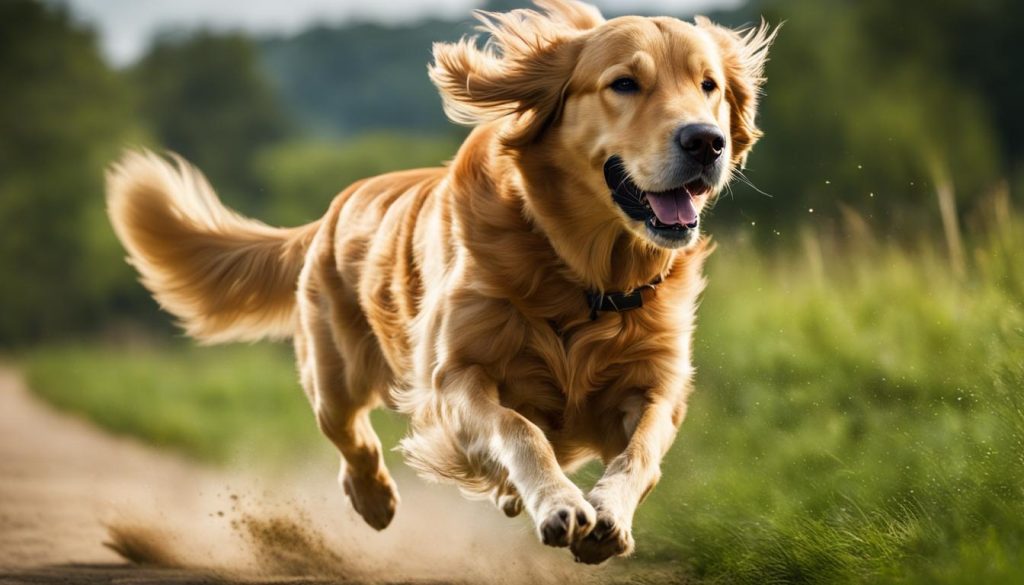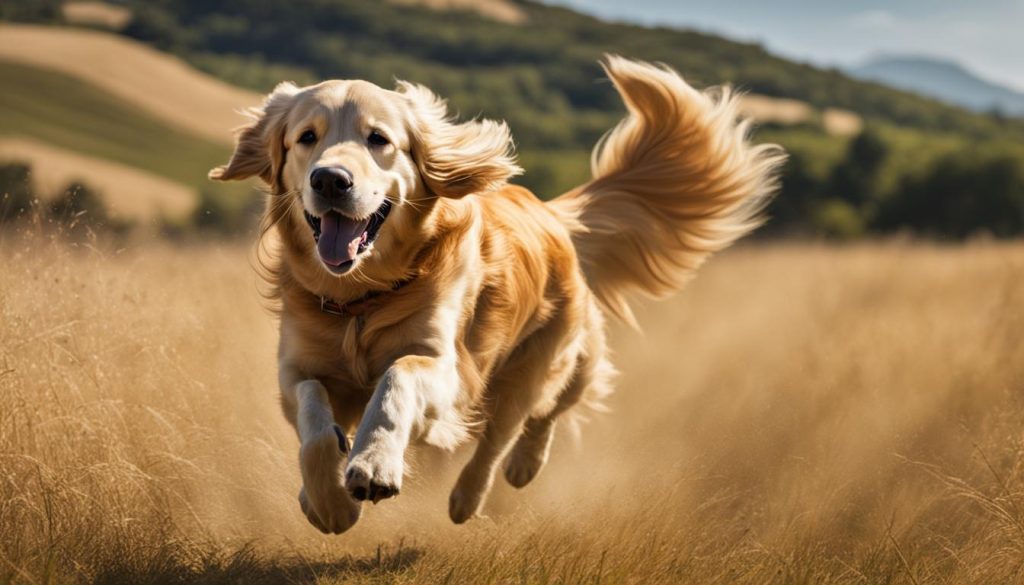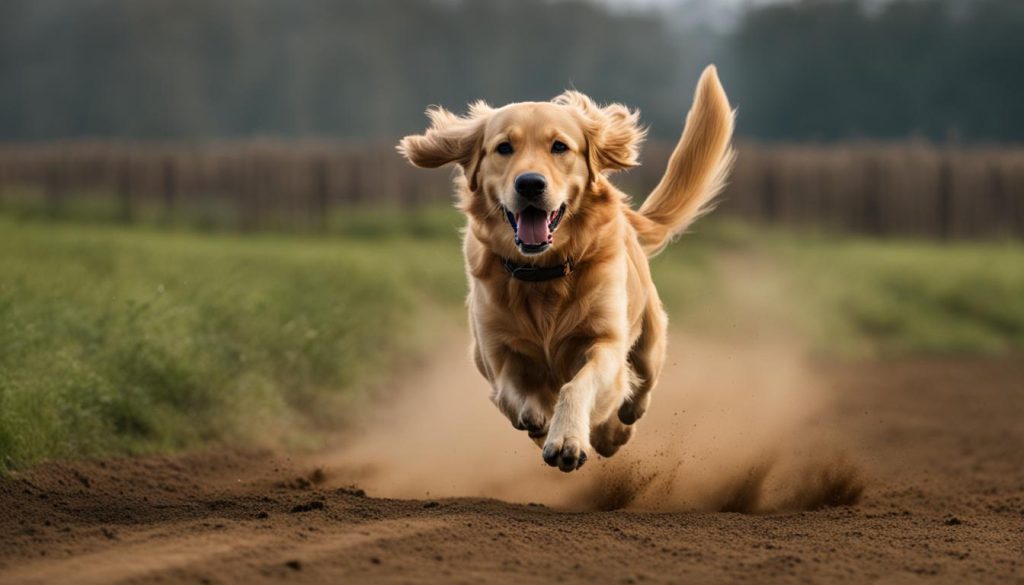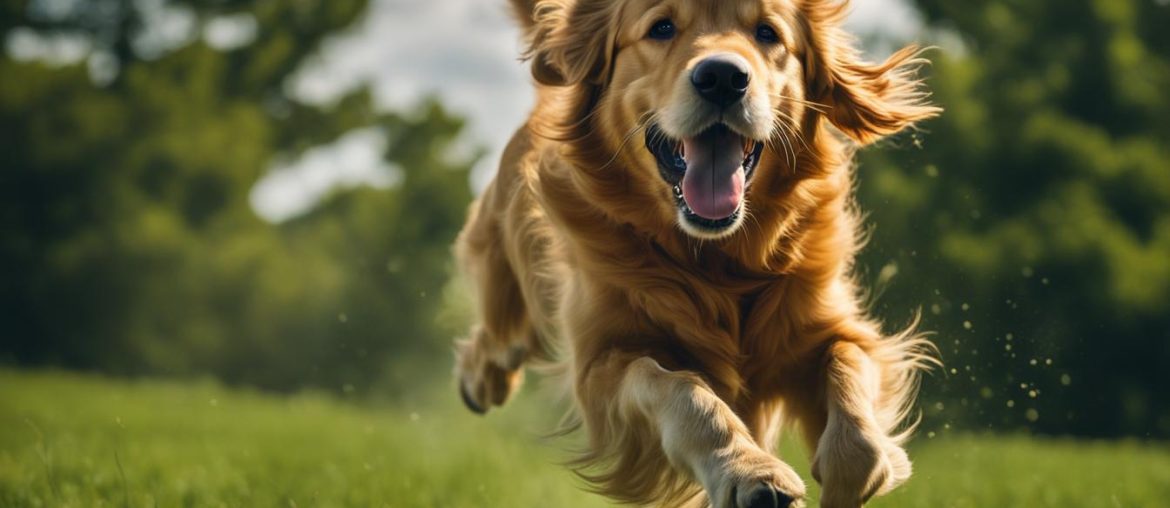Golden retrievers are well-known for their athleticism and energetic nature. Many people wonder, how fast can a golden retriever run? Let’s explore some fascinating facts about golden retriever speed and their running abilities.
Key Takeaways:
- Golden retrievers can reach top speeds of about 35 mph in short bursts.
- Their running ability is influenced by factors such as age, health, and fitness level.
- Regular exercise is essential to keep golden retrievers happy and prevent destructive behaviors.
- Golden retrievers have a muscular build that allows them to sprint, accelerate quickly, and maintain a steady pace during runs.
- Compared to humans, golden retrievers are considered fast runners, but their abilities may vary compared to other dog breeds.
Factors Affecting Golden Retriever Speed
When it comes to the speed of a golden retriever, several factors come into play. Understanding these factors can provide insights into why some golden retrievers may be faster than others. The average speed of a golden retriever, their running speed, and their top speed can be influenced by various elements.
One significant factor is age. Younger golden retrievers may not reach their full running potential until they are adults. As they mature, their muscles and coordination improve, allowing them to reach higher speeds. Additionally, regular exercise plays a crucial role in a golden retriever’s speed. By engaging in physical activities, these dogs can build endurance and increase their overall speed.
Another essential aspect is the dog’s health and fitness level. Just like humans, a golden retriever’s physical condition can impact their speed. Dogs that are in good health and maintain a healthy weight are likely to be faster than those who are not. It is important to note that each golden retriever is unique, and their speed may vary based on these factors.
Table: Factors Affecting Golden Retriever Speed
| Factor | Description |
|---|---|
| Age | Younger dogs may not reach full speed until adulthood. |
| Exercise | Regular physical activity can increase endurance and speed. |
| Health and Fitness | Overall health and fitness level can impact a golden retriever’s speed. |
It’s important to remember that while golden retrievers may not be the fastest breed overall, their running abilities are still remarkable. Their friendly, loyal nature and versatility make them excellent companions for various activities, including running, agility training, and participating in dog sports.
Golden Retriever’s Athletic Abilities and Build

Golden retrievers are known for their athletic abilities and sturdy build, making them well-suited for various physical activities. While they may not possess the same level of speed and agility as some other breeds, their muscular bodies allow them to excel in different athletic pursuits. Whether it’s sprinting, accelerating quickly, or maintaining a steady running pace, golden retrievers are versatile athletes.
Their build, characterized by a well-proportioned body and strong limbs, enables golden retrievers to generate power and endurance during physical activities. They have a natural instinct to chase and retrieve, making them great companions for activities like playing fetch or participating in agility training. Their athletic capabilities also make them suitable for dog sports such as flyball, obedience trials, and dock diving.
Golden retrievers’ aptitude for sprinting allows them to quickly cover short distances, while their ability to accelerate rapidly makes them efficient in chasing after fast-moving objects. These traits are especially useful in activities like competitive races or in the field when retrieving game. Their steady running pace, on the other hand, ensures that they can maintain endurance during longer runs or hikes. This combination of speed, agility, and stamina makes golden retrievers well-suited for various athletic challenges.
Golden Retriever’s Athletic Abilities and Build
Golden retrievers are known for their athletic abilities and sturdy build, making them well-suited for various physical activities. While they may not possess the same level of speed and agility as some other breeds, their muscular bodies allow them to excel in different athletic pursuits. Whether it’s sprinting, accelerating quickly, or maintaining a steady running pace, golden retrievers are versatile athletes.
Their build, characterized by a well-proportioned body and strong limbs, enables golden retrievers to generate power and endurance during physical activities. They have a natural instinct to chase and retrieve, making them great companions for activities like playing fetch or participating in agility training. Their athletic capabilities also make them suitable for dog sports such as flyball, obedience trials, and dock diving.
Golden retrievers’ aptitude for sprinting allows them to quickly cover short distances, while their ability to accelerate rapidly makes them efficient in chasing after fast-moving objects. These traits are especially useful in activities like competitive races or in the field when retrieving game. Their steady running pace, on the other hand, ensures that they can maintain endurance during longer runs or hikes. This combination of speed, agility, and stamina makes golden retrievers well-suited for various athletic challenges.
Exercise Needs for Golden Retrievers
Golden retrievers are energetic dogs that require regular exercise to maintain their physical and mental well-being. Daily physical activity is essential for them to burn off energy and prevent boredom, which can lead to destructive behaviors. A consistent exercise routine also helps to keep them fit and healthy.
It is recommended to provide golden retrievers with at least one hour of exercise per day, split into two sessions. This can include activities such as running, playing fetch, swimming, or participating in agility training. These exercises not only help to keep them physically active but also provide mental stimulation, as golden retrievers are intelligent and enjoy learning new things.
Benefits of Exercise for Golden Retrievers:
- Improved cardiovascular health
- Enhanced muscle strength and flexibility
- Prevention of obesity and weight-related issues
- Stress reduction and improved behavior
- Increased bond between the dog and owner
It is important to remember that each golden retriever is unique, and their exercise needs may vary. Factors such as age, health conditions, and energy levels should be taken into consideration when planning their exercise routine. Consulting with a veterinarian is recommended to ensure that the exercise plan is appropriate for the individual dog.
Regular exercise is not only beneficial for golden retrievers physically but also contributes to their overall happiness and well-being. By providing them with ample opportunities to engage in physical activities, owners can ensure that their golden retrievers lead a healthy and fulfilling life.
| Benefits of Exercise for Golden Retrievers |
|---|
| Improved cardiovascular health |
| Enhanced muscle strength and flexibility |
| Prevention of obesity and weight-related issues |
| Stress reduction and improved behavior |
| Increased bond between the dog and owner |
Golden Retriever’s Running Abilities Compared to Other Breeds
When it comes to running, golden retrievers may not be the fastest dog breed overall, but they can still hold their own against humans. With a top speed of up to 35 mph, they can easily outrun most people. However, their running abilities may differ compared to other dog breeds. While they may not have the sprinting endurance of certain breeds, goldens excel in their ability to retrieve items over long distances.
To understand how golden retrievers compare to other breeds in terms of running, let’s take a closer look at some popular dog breeds known for their speed:
| Breed | Top Speed (mph) | Endurance |
|---|---|---|
| Greyhound | 45-50 | Excellent |
| Border Collie | 30-35 | Good |
| German Shepherd | 30-35 | Good |
| Golden Retriever | Up to 35 | Decent |
As we can see from the table, golden retrievers have a respectable top speed and decent endurance. While they may not match the lightning-fast pace of a greyhound, they can still maintain a steady running pace over long distances. Their muscular bodies and athletic build make them well-suited for activities that involve running, such as agility training and participating in dog sports.
In summary, while golden retrievers may not be the fastest dog breed, their running abilities should not be underestimated. They may not have the sprinting endurance of certain breeds, but they make up for it with their retrieving skills and steady running pace. Whether you’re looking for a running partner or a dog who can fetch a ball with speed and precision, a golden retriever can be a great choice.
History and Origins of the Golden Retriever Breed

The golden retriever breed has a rich history that dates back to the 1800s in the Scottish Highlands. It was Lord Tweedmouth who first developed this breed by crossing a Tweed Water Spaniel with a yellow Retriever. His intention was to create a dog that possessed the calm temperament, trainability, and excellent retrieving skills required for hunting and retrieving game in various terrains.
Over time, the golden retriever gained recognition and popularity, both in the United Kingdom and North America. Their friendly nature, intelligence, and versatility made them not only excellent hunting dogs but also beloved family pets. Today, they continue to be cherished companions and are widely utilized in various roles due to their exceptional working abilities.
The Origins of the Golden Retriever Breed
The golden retriever breed can be traced back to the meticulous breeding efforts of Lord Tweedmouth. His vision was to create a dog that excelled in retrieving game, while also possessing the desirable traits of a loyal and affectionate companion. By carefully selecting and breeding specific dogs, he established the golden retriever breed we know today.
“Golden retrievers have a long-standing history and have become one of the most beloved dog breeds worldwide.”
Golden retrievers were initially used for hunting, but their versatility soon led to their utilization in various tasks. They proved to be exceptional guide dogs for the blind, hearing dogs for the deaf or hard-of-hearing, search and rescue dogs, therapy dogs, and detection dogs. Their adaptability and willingness to please have made them invaluable in these roles, further cementing their significance in the canine community.
| Key Points | Golden Retriever Breed History |
|---|---|
| Origin | Scottish Highlands in the 1800s |
| Founder | Lord Tweedmouth |
| Purpose | Hunting and retrieving game |
| Popular Roles | Guide dogs, therapy dogs, search and rescue dogs, detection dogs |
The golden retriever breed has undoubtedly left a lasting legacy in the world of dogs, and their impact continues to be felt in various domains. From their humble beginnings as hunting companions to their current roles as working dogs and beloved family pets, golden retrievers have become a symbol of loyalty, intelligence, and boundless affection.
Utilization of Golden Retrievers in Various Tasks

Golden retrievers are highly versatile dogs with exceptional working abilities. Their intelligence, trainability, and friendly nature make them well-suited for a variety of roles and tasks. Here are some of the key areas where golden retrievers excel:
- Guide Dogs: Golden retrievers are commonly trained as guide dogs for the blind. Their calm temperament, intelligence, and ability to navigate obstacles make them ideal partners for individuals with visual impairments.
- Hearing Dogs: These dogs are trained to assist individuals who are deaf or hard-of-hearing. Golden retrievers can be taught to alert their owners to important sounds and signals, providing a valuable service and increasing their independence.
- Search and Rescue Dogs: Golden retrievers have a keen sense of smell and excellent tracking abilities, making them valuable assets in search and rescue missions. They can locate missing persons, detect explosives or narcotics, and assist in disaster response efforts.
- Therapy Dogs: Golden retrievers are renowned for their friendly and gentle nature, which makes them perfect therapy dogs. They provide comfort and emotional support to individuals in hospitals, nursing homes, schools, and other settings.
- Detection Dogs: These dogs are trained to detect specific substances such as drugs, explosives, or agricultural products. Golden retrievers’ highly sensitive noses and ability to focus on tasks make them effective detection dogs.
In addition to these specialized roles, golden retrievers also make excellent family pets. Their loyalty, affection, and adaptability ensure they fit seamlessly into households, providing companionship and love.
Golden Retriever Working Abilities
The working abilities of golden retrievers are a testament to their breed’s unique qualities. They possess a strong work ethic, intelligence, and a desire to please their handlers. These traits, combined with their physical capabilities, allow golden retrievers to excel in various tasks and roles.
Golden retrievers have an innate ability to learn and understand complex commands and tasks. Their intelligence and trainability make them highly reliable working dogs, capable of performing tasks with precision and accuracy. Whether it’s guiding individuals, searching for missing persons, or providing therapy, golden retrievers are known for their dedication and effectiveness.
Moreover, the friendly and gentle nature of golden retrievers enables them to form strong bonds with humans, making them excellent working partners. They show empathy and compassion, which is particularly valuable in roles where they interact with vulnerable individuals or help alleviate emotional distress.
| Working Role | Golden Retriever Qualities |
|---|---|
| Guide Dogs | Calm temperament, intelligence, obstacle navigation |
| Hearing Dogs | Alertness to sounds, ability to learn and respond to signals |
| Search and Rescue Dogs | Keen sense of smell, tracking abilities, obedience |
| Therapy Dogs | Friendly, gentle nature, empathy, comfort-giving |
| Detection Dogs | Highly sensitive nose, focus, ability to detect specific substances |
Lifespan and Growth of a Golden Retriever

Golden retrievers have an average lifespan of 10 to 12 years. Proper care and regular veterinary check-ups are essential to ensure their well-being throughout their lives. It’s generally advisable to note that individual dogs may exceed or fall short of this average lifespan, depending on their genetics, overall health, and lifestyle factors.
Golden retrievers go through several stages of growth and development. They reach their full height at around one year old, but their bones continue to strengthen and mature until they are about two years old. During this period, it is crucial to provide them with a balanced diet that supports their growth and ensures proper muscle and bone development.
Between the ages of three to six months, golden retrievers often experience a growth spurt. During this time, they may seem lanky as they rapidly gain height and weight. It’s important to monitor their nutrition and adjust their diet accordingly to meet their growing needs.
Final Thoughts
To summarize, the golden retriever breed is known for its impressive athleticism and running abilities. With a top speed of up to 35 mph and excellent endurance, golden retrievers are well-suited for various physical activities. Whether they are sprinting, accelerating quickly, or maintaining a steady pace, these dogs showcase their athletic prowess.
Regular exercise is key to keeping golden retrievers healthy and happy. They have high exercise needs and should be provided with at least one hour of physical activity twice a day. This can include running, playing fetch, swimming, and engaging in other active games or sports.
Golden retrievers are not only athletic but also versatile in their capabilities. They can be trained for various tasks, such as guide dogs, search and rescue dogs, therapy dogs, and more. Their friendly nature and intelligence make them not only excellent working dogs but also beloved family pets.
With an average lifespan of 10 to 12 years, golden retrievers bring joy and companionship to their owners. From their origins in the Scottish Highlands to their widespread popularity today, these dogs have become beloved members of families around the world. To summarize, golden retrievers are a breed that truly embodies athleticism, loyalty, and versatility.
FAQ
How fast can a golden retriever run?
Golden retrievers can run up to about 35 mph in short bursts.
What factors affect a golden retriever’s speed?
The speed of a golden retriever can be influenced by factors such as age, exercise, overall health, and fitness level.
What are the athletic abilities and build of a golden retriever?
Golden retrievers have muscular bodies that enable them to sprint, accelerate quickly, and maintain a steady running pace.
How much exercise do golden retrievers need?
Golden retrievers should ideally be exercised twice a day, for a total of one hour. The amount of exercise may vary based on the individual dog.
How do golden retrievers’ running abilities compare to other breeds?
While golden retrievers may not have the sprinting endurance of certain breeds, they are still considered fast compared to humans.
What is the history and origin of the golden retriever breed?
Golden retrievers originated in the Scottish Highlands in the 1800s, developed by Lord Tweedmouth through crossbreeding.
What tasks can golden retrievers be trained for?
Golden retrievers can be trained for various tasks, including guide dogs, search and rescue, therapy dogs, and detection dogs.
What is the lifespan and growth of a golden retriever?
On average, golden retrievers have a lifespan of 10 to 12 years. They reach their full height at around one year old and full weight between 18 to 24 months.
Final Thoughts
Golden retrievers are known for their athleticism and running abilities. They are versatile and loyal companions that require regular exercise and care to stay healthy and happy.






